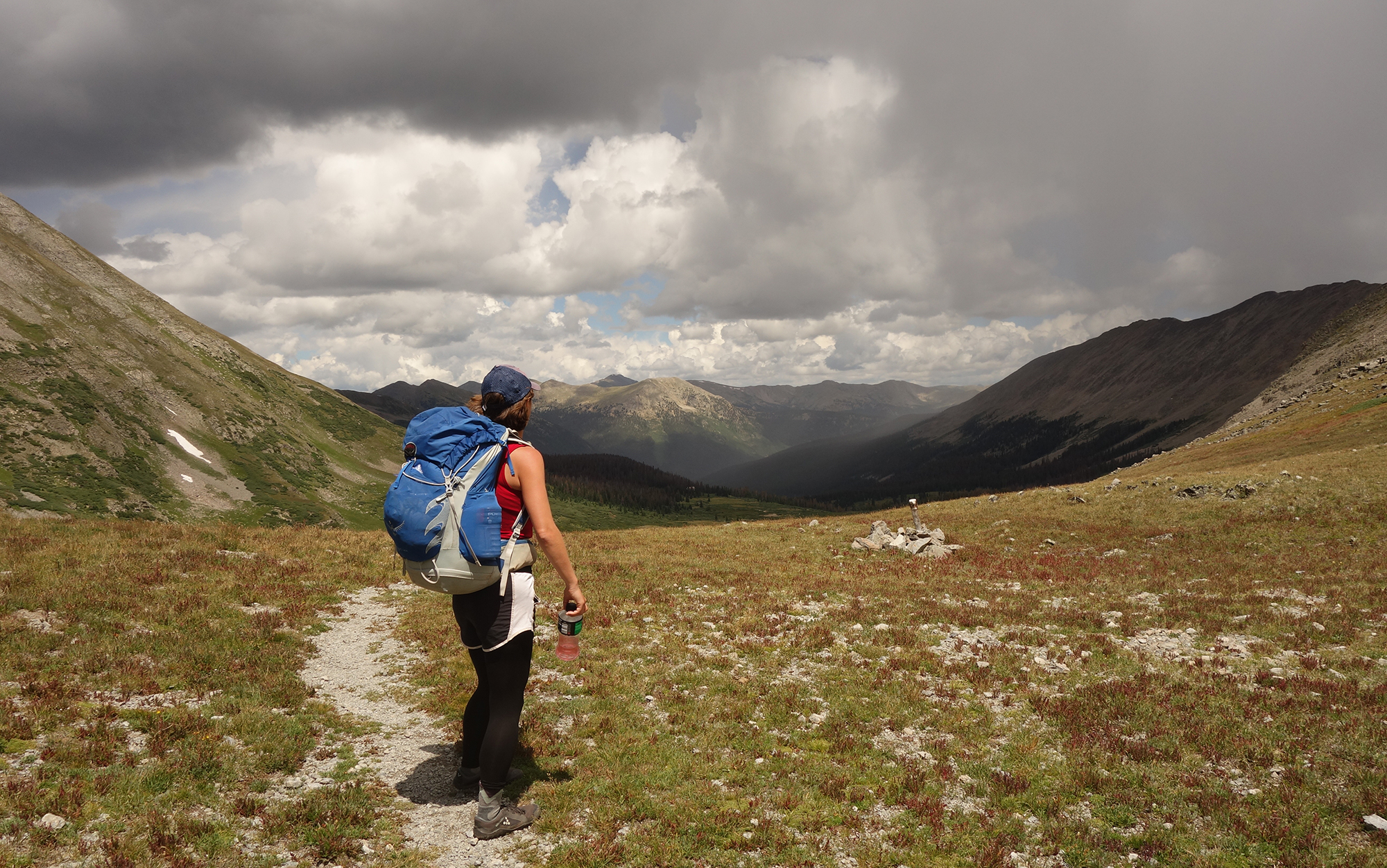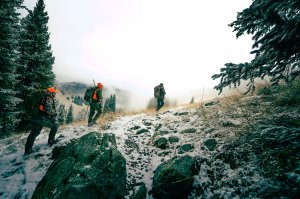We may earn revenue from the products available on this page and participate in affiliate programs. Learn More ›
Whether you’re preparing for your first backpacking trip or packing the night before your once-in-a-lifetime, it’s important to remember the essentials with a backpacking checklist. I’ve been backpacking for decades, and have based the below checklist off of what I always review before heading into the backcountry. Download a copy for yourself so that you can adjust and annotate it to fit your needs.
Backpacking Checklist
See also: Camping Checklist: Our Top Gear and Pack Lists
Backpacking Checklists for Kids, Dogs, and Reluctant Backpackers
Whether you’re bringing your kids, your dog, or your significant other for the first time, here are the camping or backpacking checklists you need to make it a success.
Gear Recommendations for Your Backpacking Checklist
When you’re ready to round out your backpacking gear list with some best-in-class options, we’ve done the testing to get you started.

Backpacks
- Our top pick: Osprey Exos
- Best for women: Gregory Deva
- Ultralight pick: ULA Circuit
- Comfort pick: Six Moon Designs Swift X
See the in-depth reviews: Best Ultralight Backpacks, Gregory Baltoro and Deva Review
Shelter
Tent
- Our top pick: Big Agnes Copper Spur HV UL2
- Ultralight pick: Gossamer Gear The One or The Two
- Budget pick: Kelty Discovery Trail
- Winter pick: MSR Access 1 or Access 2
See the in-depth reviews: Best Backpacking Tents, Best Ultralight Tents, Best Budget Backpacking Tents, Best 4-Season Tents
Tent Stakes
- Our top pick: MSR Groundhog
- Lightest: MSR Carbon Core
- Best holding power: Big Agnes Dirt Dagger UL
See the in-depth review: Best Tent Stakes
Sleep Systems
Sleeping Bags or Quilts
- Our top pick: Loco Libre Gear Ghost Pepper
- Best for tall people: Enlightened Equipment Revelation
- Traditional pick: NEMO Forte
- Budget pick: REI Co-op Trailbreak 20 Sleeping Bag
See the in-depth reviews: Best Backpacking Quilts, Best Sleeping Bags
See also: How to Choose a Sleeping Bag
Sleeping Pads
- Our top pick: Therm-a-Rest NeoAir Xlite NXT
- Best for cold sleepers: Therm-a-Rest NeoAir Xtherm
- Best features: Sea to Summit Ether Light XT Insulated Air Sleeping Mat
- Budget pick: Big Agnes Insulated AirCore Ultra
See the in-depth reviews: Best Backpacking Sleeping Pads, Therm-a-Rest NeoAir Xlite
See also: Inflatable Versus Closed-Cell Foam
Pillows
- Our top pick: Therm-a-Rest Air Head Down Pillow
- Memory foam pick: NEMO Fillo Backpacking & Camping Pillow
- Budget: Outdoor Vitals Ultralight Stretch Pillow
See the in-depth reviews: Best Backpacking Pillows
Backpacking Clothing
Clothing is a critical part of any backpacking checklist.
Hiking Shirt
- Our top pick: Fjallraven Abisko Wool Short-Sleeve
- Fastest drying: Ibex Journey Tee
See the in-depth review: Best Hiking Shirts
Hiking Pants
- Our top pick: Royal Robbins Alpine Mountain Pro Pants
- Bushwhacking pants: Kuiu Attack Pants
- Budget pick: REI Co-op Savanna Trail Pants
See the in-depth review: Best Hiking Pants
Hiking Underwear
- Our top pick: Ibex Women’s Natural Brief
- Best Synthetic: Patagonia Women’s Active Hipster
See the in-depth review: Best Hiking Underwear for Women
Hiking Socks
- Our top pick: Darn Tough Hiker Micro Crew
- Made in the USA: Farm to Feet Damascus ¾ Crew
- Trail running pick: Smartwool Athlete Edition Run Mountain Print Crew Socks
- Budget pick: REI Co-op Merino Wool Lightweight Crew
See the in-depth reviews: Best Hiking Socks, Best Wool Socks
Hiking Shoes
- Hybrid: Danner Trail 2650 Campo GTX
- Maximalist: Hoka Speedgoat
- Minimalist: Altra Lone Peak
- Budget: Merrell Moab
See the in-depth reviews: Best Trail Running Shoes, Best Hiking Shoes, Best Waterproof Hiking Shoes, Best Women’s Hiking Shoes, Waterproof Hiking Shoes for Women, Men’s Hiking Shoes, Best Hiking Boots, Hiking Boots for Men, Hiking Boots for Women, Best Thru-Hiking Shoes
Base Layers
- Our top pick: Montbell Super Merino Wool Lightweight
- Ventilation for sweaty hikers: Smartwool Intraknit
- Budget pick: Uniqlo Heattech Ultra Warm
See the in-depth reviews:Best Thermal Underwear for Men, Best Thermal Underwear for Women
Insulation Top
- Our top pick: Mountain Hardwear Ghost Whisperer
- For kids: Big Agnes Ice House Hoodie
- Budget pick: Uniqlo Ultra Light Down Jacket
See the in-depth review: Best Puffer Jackets
Rain Jacket
- Our top pick: Arc’teryx Beta LT
- Eco-friendly pick: Patagonia Storm 10
- Budget pick: Frogg Toggs Ultra-Lite Suit
See the in-depth review: Best Backpacking Rain Jackets
Cooking and Water Treatment
Stove
- Our top pick: MSR PocketRocket
- All-in-one pick: Jetboil Stash
- Budget pick: GSI Glacier Camp Stove
See the in-depth reviews: Best Backpacking Stoves, MSR PocketRocket 2
Lighter
- Our top pick: MSR Piezo Igniter
- Refillable: Zippo Chrome Lighter
- Budget pick: BIC
See the in-depth review: Best Camping Lighters
Water filter
- Our top pick: Sawyer Squeeze
- Fastest flow: Platypus QuickDraw
- Treatment drop pick: Aquamira
See the in-depth review: backpacking water filters
Safety
Satellite messenger
- Our top pick: Garmin inReach Mini 2
- Lowest Upfront Cost: ZOLEO
- Budget pick: SPOT Gen4
See the in-depth review: Best Personal Locator Beacons and Satellite Messengers
Headlamp
- Our top pick: BioLite Headlamp 325
- Best battery life: Petzl Tacitkka +RGB
- Budget pick: Decathlon Forclas HL 500
See the in-depth review: Best Headlamps
Knife
- Our top pick: Opinel Nomad Cooking Kit
- Lightweight: Benchmade Bugout
- Budget: Schrade
See the in-depth review: Best Camping Knives
Other
Personalize your backpacking checklist with these pieces of gear.
Trekking Poles
- Our top pick: Leki Makalu FX Carbon
- Value pick: Cascade Mountain Tech Ultralight Carbon
- Minimalist: Zpacks Minimalist Trekking Pole
See the in-depth review: Best Trekking Poles
Power Bank
- Our top pick: Goal Zero Flip 12
- Water-resistant pick: Goal Zero Venture 35
- Budget pick: Mophie Powerstation
See the in-depth reviews: Best Power Banks, Best Power Banks for Camping
Sunglasses
- Our top pick: Costa Caleta
- Ultralight pick: Maui Jim Wailua
- Budget pick: Goodr Everglades
See the in-depth review: Best Hiking Sunglasses

FAQs
Backpackers should plan to carry shelter, a sleep system (including a sleeping bag and a sleeping pad), appropriate clothing for the temperatures they expect to see, and food and water (or water treatment). Our checklist (above) includes other items that can help ensure your safety in the great outdoors including sunscreen, a headlamp, and a personal locator beacon. If you are backpacking for the first time, consider consulting with someone more experienced or heading out on a shorter distance trip until you are comfortable with the kit you are taking with you.
Longer trips can be logistically complicated because of the additional weight you will need to carry. While overnight backpackers might plan to bring a separate out for each day they are out on the trail, for longer trips it can be more expedient to bring along a biodegradable soap and lightweight clothes line so that you can do your laundry as you go. Some backpackers may even appreciate bringing along one of the best camping showers. While bringing along a personal locator beacon is a smart idea on any backpacking trip, it’s extremely important on longer trips where you may have fewer check-in points along the way. When planning out your food strategy, especially if have limited resupply options long the way, consider carefully how much fuel you will need and whether you would benefit from going cook-free for any part of your journey.
It’s common for first-time or inexperienced backpackers to carry more weight than they need. There are a number of reasons for this, from not appreciating how numerous small items can compound to add a lot of extra weight to their kit, to bringing superfluous items (like tools or unnecessary articles of clothing) just in case. The above checklist covers everything you need for backpacking, in most conditions. Anything beyond that list can be considered “extra” and should be limited in scope.
Most typical backpackers wear a synthetic or merino wool T-shirt, running shorts, and trail running or hiking shoes. In environments where ticks (and Lyme disease) are a concern, backpackers typically wear longer pants for protection. In extremely hot-weather and/or exposed environments some backpackers will wear lightweight long pants and long-sleeve shirts.
A zero in backpacking refers to taking a day off at a trail town (or occasionally on trail), hiking zero miles along your route in a day.
The heaviest backpacking items are called “the Big 3,” and refer to your backpacking backpack, your tent, and your sleep system (sleeping bag and pad).
Beginner backpackers should aim to carry no more than 25 to 35 pounds total, depending on their personal size and weight (since larger individuals will need larger gear and typically eat more food).
A 40-liter backpack is enough for three days of backpacking, if it can hold all of your gear. If you are a first-time or beginner backpacker, you likely have a bulkier sleeping bag and tent than someone who has been backpacking for a long time and has invested in more space-efficient, lighter weight gear. If you are purchasing a backpack for the first time, then a 40-liter backpack can help ensure you don’t overpack your gear. However, if you are looking at upgrading your kit and are unsure as to whether your kit will fit into a 40-liter pack, it may be better to look at upgrading your tent or sleep system first.
While there is the occasional backpacker who wears deodorant, the vast majority do not.
How much water you should bring backpacking depends on a few factors. The first, and most important, is the availability of water along your trek. If no water is available, you will need to carry enough water for your trek. Conversely, if water is available every few miles, you should instead carry one of the best backpacking water filters and plan to collect water as you hike. Frequently, the reality is something in between; there is some water available, but not enough that you can simply stop a stream every time your bottle runs dry. In those instances, you should evaluate how far you plan to hike in a day, and the longest distance is between water sources. Most people will need to drink about a gallon of water in a day (more in hotter environments), plus water for cooking or cleaning. Plan to carry sufficient water capacity (around 4 to 8 liters) in the form of water bottles or water reservoirs along with a backpacking water filter.
While there are bushcraft techniques for purifying water in the backcountry, these are rarely practical for backpackers, who will be moving from camp to camp each day. The exception to this is boiling water for one minute. If you plan to go this route, plan to bring plenty of fuel, if it is not available naturally in your environment.
Forty pounds is heavy for backpacking. Most backpackers should expect to carry between 25 and 30 pounds for an overnight, with heavier loads occurring for longer distances or in unusual circumstances (such as winter backpacking or backpack hunting).
See also: How to Pack a Backpack
Final Thoughts on the Backpacking Checklist
Having the right gear on a backpacking trip can make or break your hike. We’ve compiled a backpacking checklist of our favorite picks, based on decades of experience. Keep this checklist handy and you’ll never forget a piece of your kit again.

